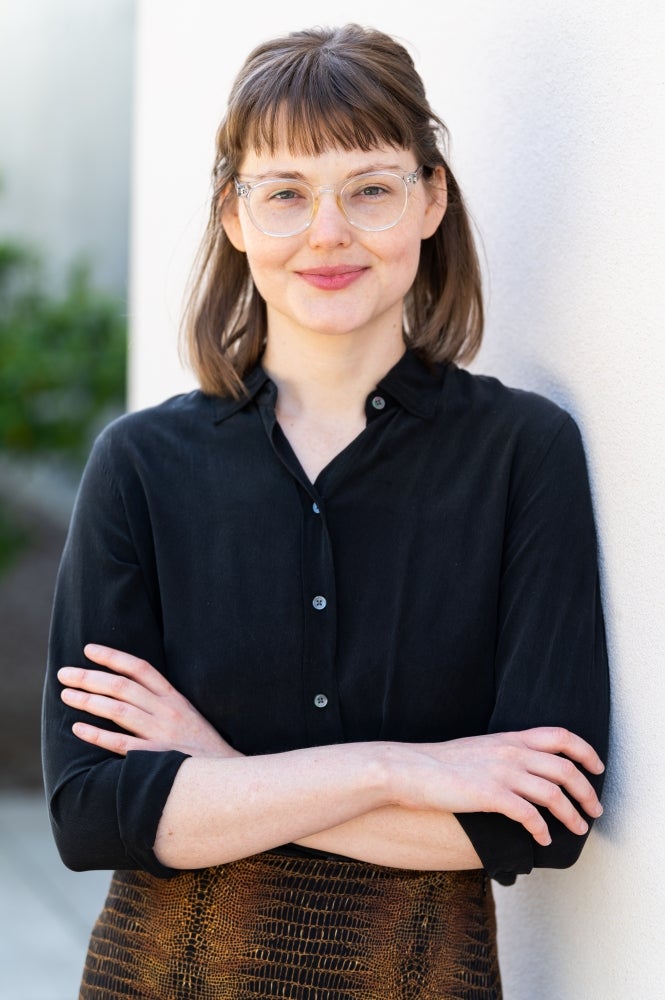
The Value of Health

Teenagers, as a rule, don’t know a whole lot about health insurance. But Laura Halcomb was way ahead of her peers.
“My parents were divorced, and they both had insurance,” recalled the Ph.D. candidate in sociology at UC Santa Barbara. “I would switch between plans depending on what I needed.
“My mom had an HMO, which was cheaper and easier to use, but gave you less choice than my Dad’s PPO. I remember I was on my Mom’s HMO when, at age 17, I needed to see a specialist, so I used my Dad’s insurance. I remember my Mom taking me to the specialist’s office and saying ‘Wow — this is really nice!’”
That visit not only exposed Halcomb to the disparities inherent in our health care system. It also foreshadowed her academic career. A specialist in medical sociology, she is deep at work on her dissertation, “Negotiating the Costs of Cancer Care.”
In it, she analyzes the complex and sometimes convoluted system of health care economics in the United States, including the often inscrutable methods by which prices get determined, and the ways doctors, hospitals, insurance companies and pharmaceutical companies jockey to make the system work for them.
“My experiences with the health care system have definitely shaped my interest in the topic,” said Halcomb, whose research combines qualitative interviews with secondary data analysis.
Her path to completing that dissertation just got a lot smoother. She has been awarded a Charlotte W. Newcombe Doctoral Dissertation Fellowship, which is given to Ph.D. candidates who are “addressing questions of ethical and religious values in interesting, original or significant ways.”
Verta Taylor, Distinguished Professor of Sociology at UC Santa Barbara and department chair, congratulated Halcomb on receiving the prestigious fellowship, noting it “will support her innovative research on the cultural, medical and economic processes that influence the provision of healthcare in the U.S.
“Her findings point to the role that charity plays in colorectal cancer patients’ treatment, showing how charity care perpetuates unequal access to treatment in the US’s market-based health care system,” Taylor added. “We are very proud of our students’ research that speaks to urgent social issues, such as health care equity.”
Born in Fullerton, California (a city in Orange County), Halcomb earned a bachelor’s degree in philosophy from Boston University, with a focus on ethics. But even before graduating, she found her focus shifting from abstract constructs to practical concerns.
“I thought I was going to go to law school, but I took a sociology class the summer before my final year,” she recalled. “I thought, ‘This is really cool!’ I met a professor who advised me on an independent research project my senior year, about looking at single mothers by choice. I enjoyed doing that research, and my adviser suggested I apply to graduate school in sociology.”
At the University of Houston, where she earned her master’s degree, “my initial plan was a study on birth control,” she said. “I was told about a plan to manufacture an affordable, long-acting, reversible contraceptive — a $45 IUD. People kept mentioning the price to me, which made me really curious as to why it was $45. IUDs are not particularly new technology.
“I came to realize that the reason it was $45 was someone decided it would be $45. I’m not sure an economist would agree with me, but ultimately it was a decision about production and profit margins.”
As she dug further into pricing of medical devices, Halcomb came across the argument that nothing can be done about our apparently arbitrary system because any price restrictions would compromise quality. “Yet, anecdotally, I kept hearing complaints about how absurd it is — stories like, ‘I got a bill and the hospital charged me $200 for an aspirin,’” she said.
Determined to learn more, “I started talking with people who work with those complicated numbers on a regular basis, and have thought about why things are priced the way they are, and how people feel about it.” Her dissertation will examine that topic from a wide variety of perspectives.
Halcomb has been at UC Santa Barbara for the past seven years, working toward her doctorate. That effort was slowed by pandemic-driven restrictions; for more than a year, she was unable to do the in-person interviews that are an essential component of her research.
But she will soon return to that work, speaking with cancer patients about how they dealt with the costs of their care. Pre-pandemic, she spoke with a number of oncologists, and found that “on the whole, they wouldn’t blame the pharmaceutical companies for the high price of cancer drugs. They were much more openly critical of and hostile towards insurance companies.”
Halcomb did make good use of her time during lockdown, poring over transcripts of Congressional hearings about drug prices, and analyzing the approaches taken in Go Fund Me campaigns dedicated to paying for colorectal cancer treatment. Out of more than 1,600 such efforts, she found most involved a third party asking for funds for a friend or relative in need, “which mitigates the stigma for patients who need financial assistance.”
To Halcomb, the fact people have to strategize regarding the most effective way to raise money they desperately need suggests the precariousness of our health-care payment system — and the need to study it further to come up with potential solutions. To that end, she is grateful to receive the Newcombe Fellowship from the Institute for Citizens & Scholars, which gives her $30,000 to complete her dissertation.
“It’s a really nice kind of fellowship,” she said. “You have funding, so you can spend your time thinking and writing and reading books in your last year.”
Among the topics she spends time pondering: The fact Americans hate the idea of the government rationing health care, even as so many effectively ration it for themselves by delaying trips to the doctor for fear of the cost.
Needless to say, these delays can be dangerous and, ironically, make care more expensive, ultimately widening inequality. That’s both a practical question and a moral one — an intersection Halcomb finds particularly worthy of study.
“I find sociology to be an interesting way of thinking about right and wrong,” she said.



